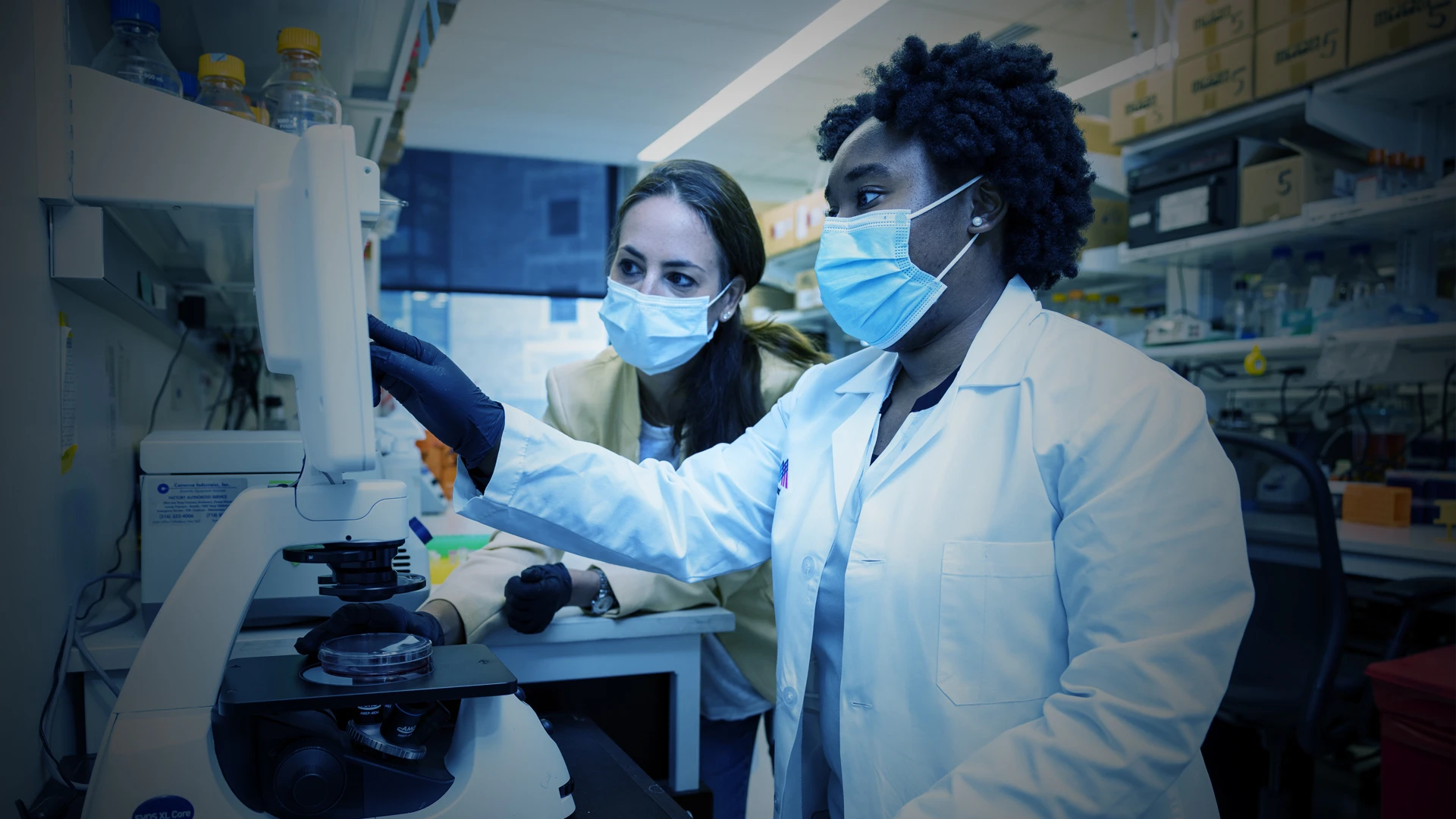While scientists have speculated about the tumor-suppressive role of the ARID2 gene, molecular information on how mutations to this critical gene impact cancer growth and progression have been conspicuously absent. This is likely due to the fact that the protein product of ARID2 acts together with many other proteins as part of a large chromatin remodeling complex, making it challenging to study.
That mystery is starting to unravel thanks to the work of Emily Bernstein, PhD, Co-leader of the Cancer Mechanisms Research Program at The Tisch Cancer Institute. In a study to characterize the tumor-suppressive function of ARID2 in melanoma—the first in this cancer—Dr. Bernstein and her team suggest that patients with a mutation in that gene may have a more aggressive form of the disease that requires more intense monitoring and treatment. The study was published in April 2022 in Cell Reports.

Emily Bernstein, PhD (center), with PhD student Anisha Cooke (left), and Naomi Calhoun, a student participating in the Summer Undergraduate Research Program for Underrepresented Scholars.
ARID2 is the most frequently mutated gene encoding a chromatin remodeling subunit in melanoma. Dr. Bernstein’s team discovered, in vitro and in animal models, that modeling ARID2 loss-of-function mutations in melanoma cells has profound effects on balance between the two predominant chromatin remodeling complexes of proteins found in those cells: BAF and PBAF, both of which have roles in transcriptional regulation, DNA repair, and chromatin architecture in oncology.

Representative images showing, in a chicken chorioallantoic membrane (CAM) model, ARID2 knockout cells had a marked increase in dissemination to the lower CAM compared to wild type, which implicates for higher tumor invasion and metastasis risk.
“We specifically learned that when ARID2 is depleted, the PBAF complex essentially falls apart, allowing BAF to ‘take over’ and drive expression of a set of genes that are classic signatures of melanoma invasion,” notes Dr. Bernstein, Professor of Oncological Sciences, and Dermatology, at the Icahn School of Medicine at Mount Sinai.
The Mount Sinai team demonstrated that BAF was redistributed to sites across the genome associated with open chromatin upon the loss of ARID2 in melanoma. “In line with that, we found that cancer cells that switch to the BAF complex in the absence of ARID2 are more likely to metastasize,” Dr. Bernstein says.
Catching the Early Signs
Dr. Bernstein’s research could be a positive step in curbing the threat of melanoma. “ARID2 mutations are found in very early melanoma lesions, suggesting to us they might serve as biomarkers for this cancer,” she explains. “Moreover, they may need to be treated more vigorously than other cancers to prevent them from invading deeper portions of the skin and spreading to other tissues. This means very close monitoring of these patients and, potentially, resecting at a much earlier stage.”

Dr. Bernstein is working with postdoctoral fellow Elena Grossi, PhD, and others, to understand the mechanisms of melanoma development, which could ultimately lead to better therapeutics.
Melanoma occurs when the pigment-producing cells in the skin, melanocytes, begin to reproduce uncontrollably. When caught early, melanoma can be treated successfully, thanks in large part to recent advances in immunotherapies. But the disease can also be quite aggressive and spread from tumors as small as several millimeters to vital organs such as the brain, making it the deadliest form of skin cancer. The risk of melanoma increases rapidly in adults between the ages of 20 and 50, adding to the urgency of early detection.
As a chromatin biologist, Dr. Bernstein studies epigenetic regulation of gene expression in cancer and its progression, with the long-term goal of understanding the chromatin changes that take place at the molecular level during the transformation of normal cells to malignant ones. Evidence she and her team gathered in their study suggests that epigenetic regulation may play an important role in melanoma development, potentially paving the way for therapeutic solutions.
“The BAF complex is a potentially good target for therapies, which is why companies are already designing inhibitors to the enzymatic and non-catalytic subunits of the complex, as well as degraders of these same proteins in cells,” Dr. Bernstein notes. “Through our research, we believe we’re moving the field closer to an understanding of how to drug these mutations from an epigenetic perspective.”
Featured

Emily Bernstein, PhD
Co-leader of the Cancer Mechanisms Research Program
